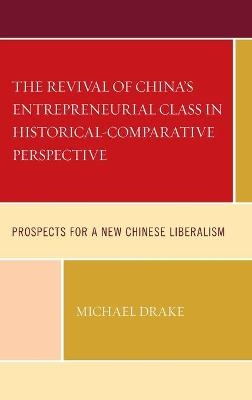
The Revival of China's Entrepreneurial Class in Historical-Comparative Perspective
Prospects for a New Chinese Liberalism
Seiten
2020
Lexington Books (Verlag)
978-1-7936-1997-6 (ISBN)
Lexington Books (Verlag)
978-1-7936-1997-6 (ISBN)
This book traces the rise, fall, and revival of China’s entrepreneurial class through the lens of historical liberalism. The author argues that China’s rule by law system and resultant state predation contributes to the rise of a liberal entrepreneurial class and prospects for entrepreneurial-driven political change.
This book examines the evolution of China’s entrepreneurial class and prospects for entrepreneurial-driven political institutional change. The author argues that decades of economic reforms and social transformation have illuminated a fundamental contradiction in contemporary China—a rule by law closed political system governing over an emergent entrepreneurial class requiring property protection—that requires resolution. The author argues that the Chinese Communist Party has one of two choices: crush the entrepreneurial class, and with it, economic growth and the party’s legitimacy, or cede to the entrepreneurs’ demands for the rule of law and political representation. The author’s interviews with Chinese entrepreneurs show the rise of liberal qualities—rationality, autonomy, property-law interests, political awareness and political agency—among China’s new entrepreneurial class. As such, the author believes that this liberal trajectory among China’s entrepreneurs, in conjunction with a lack of viable alternatives for the party, will translate into a new Chinese liberalism and ultimately political change.
This book examines the evolution of China’s entrepreneurial class and prospects for entrepreneurial-driven political institutional change. The author argues that decades of economic reforms and social transformation have illuminated a fundamental contradiction in contemporary China—a rule by law closed political system governing over an emergent entrepreneurial class requiring property protection—that requires resolution. The author argues that the Chinese Communist Party has one of two choices: crush the entrepreneurial class, and with it, economic growth and the party’s legitimacy, or cede to the entrepreneurs’ demands for the rule of law and political representation. The author’s interviews with Chinese entrepreneurs show the rise of liberal qualities—rationality, autonomy, property-law interests, political awareness and political agency—among China’s new entrepreneurial class. As such, the author believes that this liberal trajectory among China’s entrepreneurs, in conjunction with a lack of viable alternatives for the party, will translate into a new Chinese liberalism and ultimately political change.
Michael Drake is an independent scholar.
Chapter One: Introduction: The Search for a Renewed Chinese Liberalism
Chapter Two: Liberal Class Development in England and France
Chapter Three: Illiberal Class Development in China: 907-1976
Chapter Four: China’s Private Entrepreneurs: Economic Rationality and Autonomy
Chapter Five: China’s Private Entrepreneurs: State Predation and the Rise of Property-Law Interests
Chapter Six: China’s Private Entrepreneurs: the Formation of Liberal Political Values?
Chapter Seven: Conclusion: Prospects for a Contemporary Chinese Bourgeoisie
| Erscheinungsdatum | 10.05.2021 |
|---|---|
| Verlagsort | Lanham, MD |
| Sprache | englisch |
| Maße | 161 x 228 mm |
| Gewicht | 426 g |
| Themenwelt | Geisteswissenschaften ► Geschichte ► Regional- / Ländergeschichte |
| Wirtschaft ► Volkswirtschaftslehre ► Wirtschaftspolitik | |
| ISBN-10 | 1-7936-1997-2 / 1793619972 |
| ISBN-13 | 978-1-7936-1997-6 / 9781793619976 |
| Zustand | Neuware |
| Haben Sie eine Frage zum Produkt? |
Mehr entdecken
aus dem Bereich
aus dem Bereich
Erinnerungen
Buch | Softcover (2024)
Pantheon (Verlag)
CHF 22,40


